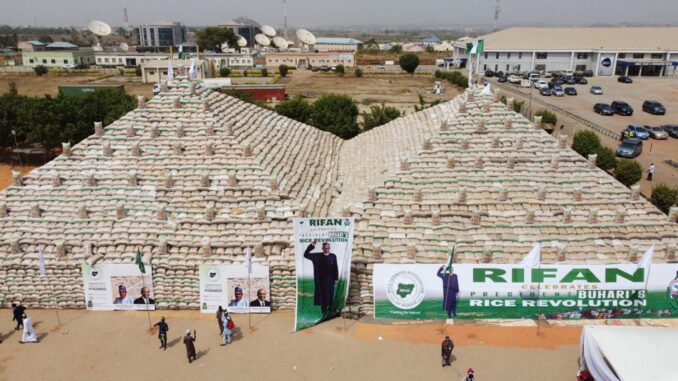
With the recent ‘exploits’ recorded in the rice sector, majority of Nigerians believe that the country doesn’t have any business importing the commodity to fill the huge demand gap.
If the recent claim of the Federal Government, especially with the unveiling of the Central Bank of Nigeria/RIFAN Paddy Pyramids in Abuja, adjudged the largest rice pyramid in Africa, is anything to go by, local rice should be available across the country at affordable prices.
The Federal Government claimed that rice production has increased to over 7.5 million metric tons yearly, from less than four million metric tons recorded in 2015, prior to the introduction of Anchor Borrowers Programme (ABP).
Even the Rice Farmers Association of Nigeria (RIFAN), last week, asserted that Nigeria may soon begin exportation of the commodity, as it is already self sufficient in rice production.
While unveiling the Pyramids, President Muhammadu Buhari said before the launch of the ABP, there were only 15 standard rice mills in Nigeria. “As at today, we have over 50 standard and integrated rice mills creating jobs and reducing unemployment. We expect additional significant output when two new mills begin operation in Lagos and Katsina.”
The President explained that the large margins in the business of rice had also encouraged more people to invest in agribusiness.
But since the launch last Tuesday in Abuja, instead of applause, criticisms have trailed the project, as stakeholders, industry players and analysts say, ”the pyramid did not match up to reality.”
They claimed that the unveiling exposed the insincerity of the Federal Government that the much hyped rice sufficiency in the country is a facade, as it has failed to yield the desired result.
Though the Chairman, Pyramid Sub-Committee of RIFAN, Shehu Muazu, said the paddy was collected from the beneficiaries of the ABP under its business strategy partnership across the country, but some stakeholders who are privy to information about the rice alleged that majority of the paddy were procured from neighbouring Cameroun, Niger Republic, Togo and Benin Republic.
The main opposition party, the Peoples Democratic Party (PDP), not only flayed the rice pyramids, it described it as pyramids of lies.
The National Publicity Secretary, Debo Ologunagba, said the exercise was “another shameless media stunt to again beguile Nigerians ahead of 2023 elections.
“Nigerians are already aware and the pictures abound of how the All Progressives Congress (APC) and its government created fake pyramids of rice with sandbags and re-bagged rice stacked on pyramid-shaped wooden structures as busted in an APC-controlled state in the Southwest in 2018.”
The Chief Executive Officer of Green Sahara Farms, Suleiman Dikwa, described the launch as Public Relations stunt. “We are talking about food security, food for about 200 million people, it is not about staging rice in Abuja or the quantity being put in the context of our population. Food security has five components —
affordability, nutrition, availability and other indices, so, it’s not about having rice pyramid in Abuja, but having rice pyramids all over the country. To put this in context, it is a Public Relations stunt. Though there has been improvement in the production of rice, but it has been very inefficient and uncompetitive. So, what we should be looking at is how do we fix the value chain? How do we make our rice competitive so that smuggling will be stopped? Look at the cost of bringing the rice to Abuja.
“No doubt, there has been great improvement in the agric sector, but the approach is totally wrong, the value chain is completely wrong, we don’t have competitive advantage in rice production, we still find foreign rice all over the country.”
Dikwa said Nigerians should not expect reduction in the price of rice soon as promised by the Federal Government, as there is no structure or dynamics to make the price fall.
He said: “It’s economics, the fundamentals are not there, the infrastructure are not there, the knowledge is not there. The Asian countries have been doing this for more than 10 generations; so we cannot develop that competency within a generation not to talk of within a tenure.
“We don’t have the seed, we don’t have land preparation skills, we don’t have the harvest skills – our post harvest losses is about $2.4b, those are the factors we need to take care of before we plan more of anything”.
If you watch the train of commodity prices in Nigeria in the last four years, it’s just been bullish; I don’t see any structure or dynamics to make the price fall. I don’t see the price of rice dropping anytime soon.”
The CEO of Fourteen Farms, Ifeware/Ife, Osun State, Julian Akinremi, said the rice pyramid does not match with reality. “I doubt if the pyramid is real, it’s like a slap on the face of the farmers. Nigeria is not too small to produce such magnitude of rice pyramid because we have the capacity to do it and even more. I actually feel that over the years we have been hearing news of government trying to push rice production, yet we have not seen the price of paddy go down.
“It’s obvious that the much hyped initiative of government is a fluke because despite the initiative, the price of paddy has risen from around N8, 000 per ton in 2019 to between N16, 000 to N20, 000 currently — over 100 per cent increase.
“So, we can’t actually buy rice at affordable price locally. If the rice pyramid is actually backed up with initiatives that will make it possible to be a reality, I think it will be good, if not, I don’t know the purpose of the pyramid then.”
END

Be the first to comment